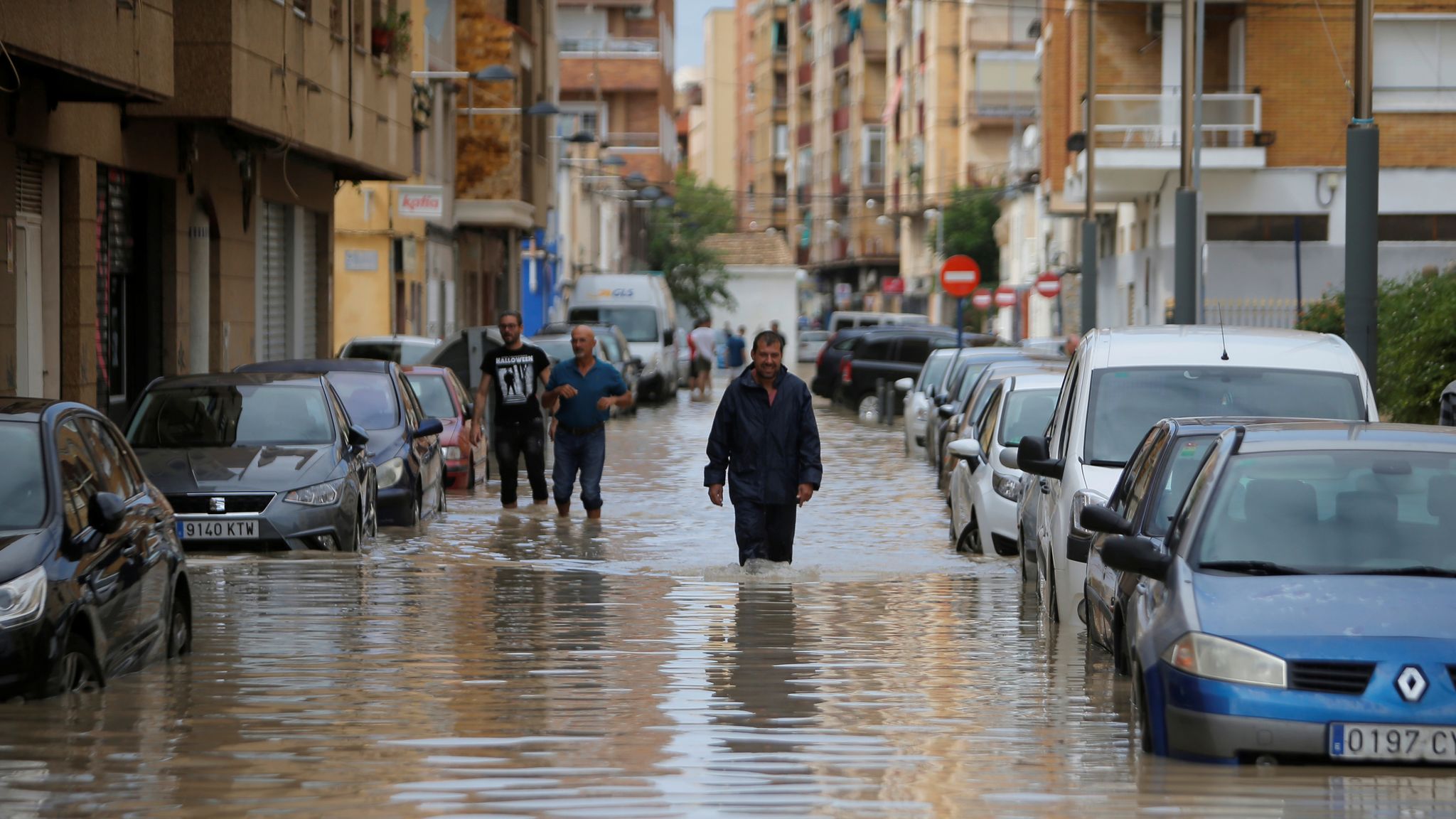


The country of Spain has been ravaged by severe weather, with heavy rain and hailstorms causing flash floods and disruptions to travel. As many as seven people have been reported missing, prompting concern from Prime Minister Pedro Sanchez. The storm has also triggered alerts from the state meteorological agency, highlighting the severity of the situation. This news serves as a reminder of the devastating effects of extreme weather on communities around the world.
Spain Devastated by Severe Weather: Heavy Rains, Hailstorms Trigger Flash Floods and Missing Persons
Background
Spain is no stranger to extreme weather events, particularly during the fall and winter months. The country's geographical location and mountainous terrain often lead to heavy rainfall, strong winds, and hailstorms. Over the years, Spain has experienced several notable severe weather events that have caused significant damage and loss of life.
Current Event
In recent days, Spain has been battered by a series of severe thunderstorms, bringing heavy rain, hail, and flash floods to various parts of the country. The storm has reportedly left seven people missing, prompting concern from authorities. The state meteorological agency has issued severe weather alerts, warning of potential further disruptions and dangers.
Impact
The heavy rainfall and hailstorms have caused widespread flooding, damaging roads, bridges, and homes. Flash floods have swept through towns and villages, carrying away cars and debris. Transportation has been severely affected, with train and bus services canceled or delayed. Power outages have also been reported in some areas.
Missing Persons
As of the latest reports, seven people remain missing as a result of the storm. Search and rescue teams are actively searching for the missing individuals. The Prime Minister has expressed his concern and has called for a swift and thorough search operation.
Top 5 FAQs
1. What is causing the severe weather in Spain? The severe weather is primarily due to a combination of atmospheric instability and the interaction of cold and warm air masses.
2. What areas of Spain have been affected? The storm has affected several regions of Spain, including Andalusia, Murcia, Valencia, and Catalonia.
3. How many people have been killed or injured? As of the latest reports, no fatalities have been reported. However, there are seven people missing who are presumed injured.
4. What is the extent of the damage? The damage from the storm is still being assessed, but it is widespread and includes flooding, damaged infrastructure, and power outages.
5. What is being done to help those affected? Local and regional authorities, along with emergency services, are working to assist those affected by the storm. Search and rescue operations are underway, and efforts are being made to restore essential services.

Russian President Vladimir Putin visits India for a 27-hour trip to meet Prime Minister Narendra Modi and discuss a wide range of topics. The two leaders had a private dinner where they set the tone for the official summit talks the following day. During the talks, PM Modi announced a 2030 Economic Cooperation Programme and discussed economic and energy cooperation with Putin. Additionally, they also emphasized the need to jointly combat terrorism and find a peaceful resolution to the conflict in Ukraine.

In a shocking development, it has been discovered that the bodies of several victims repatriated to the UK following the Air India crash in Ahmedabad were found to contain dangerous levels of formalin, carbon monoxide, and cyanide. This was revealed by Professor Fiona Wilcox, who is leading the investigation into the deaths of 53 British nationals in the crash. The report highlights the lack of awareness about the dangers of formalin exposure in morgues across the UK, putting mortuary staff at risk. Immediate measures have been taken to mitigate the danger, but the report raises concerns about the handling of bodies in such facilities.

Russian President Vladimir Putin and Indian Prime Minister Narendra Modi met in India for discussions on strengthening their countries' strategic partnership. This meeting comes at a time when Russia and India are facing increasing pressure from the United States, with the US imposing tariffs on Indian purchases of Russian oil and Russia's ongoing conflict with Ukraine. Despite these challenges, Modi and Putin have maintained a strong personal relationship and are seeking to deepen their cooperation.

Russian President Vladimir Putin's visit to India has garnered significant attention as it takes place amidst strained relations between India and the US. His 27-hour visit included a ceremonial welcome at the Rashtrapati Bhavan, laying a wreath at Rajghat and taking part in a dinner with PM Modi. The highlight of the visit was PM Modi's gift of a copy of the Bhagavad Gita in Russian, emphasising the cultural and philosophical bonds between the two countries.

The Pakistani government has come under heavy criticism after images claiming that their relief aid to Sri Lanka contained expired products went viral on social media. The supplies, intended for families affected by Cyclone Ditwah, were sent as emergency assistance but were found to have an expiry date of October 2024 printed on the packaging. This discovery has sparked outrage and disbelief, with netizens slamming the Pakistani authorities for their insensitivity and lack of attention to detail.

Thousands of passengers, including Tamilians and other Indian nationals, have been trapped at the Bandaranaike International Airport in Colombo for the past few days due to the devastation caused by Cyclone Ditwah. The Indian High Commission has reaffirmed its commitment to helping its neighbor by delivering urgent humanitarian aid and disaster relief through Operation Sagar Bandhu. Along with providing relief materials, the Indian government is also coordinating with the Sri Lankan government to facilitate the safe return of stranded passengers. Meanwhile, Prime Minister Narendra Modi has expressed sorrow over the loss of lives in Sri Lanka and has promised immediate support from India.

Amidst a fragile ceasefire, Israel carried out a targeted airstrike in the Lebanese capital of Beirut, killing five people and injuring dozens more. The strike was ordered by Israeli Prime Minister Benjamin Netanyahu and has drawn criticism from both the Hezbollah and the Lebanese President. This attack marks a significant escalation in tensions between Israel and Hezbollah, who have been in a state of war for almost two years.

Rajnath Singh spoke at a public event where he reinstated the key role that cultural bonds play in India's global hegemony and asserted Sindh's continued significance to Indian heritage Seeing the ever stronger connection between Sindh and India that has recently seen acknowledgement from the people of Pakistan-occupied Kashmir themselves, in the coming years boundaries could realign providing a pathway for Sindh to once again be a part of India.

Indian Prime Minister Narendra Modi arrived in Johannesburg for the G20 Leaders’ Summit in South Africa, where he will engage in bilateral meetings and participate in the IBSA Summit. This marks the first time the G20 is being held in Africa, with the focus being on building solidarity, equality, and sustainability. PM Modi also expressed his excitement to meet with the Indian diaspora in South Africa, highlighting their strong presence in the country. He will present India's perspective on global issues, emphasizing the country's vision of 'Vasudhaiva Kutumbakam' (the world is one family).

As India commemorates its Independence Day in 2025, it's important to share the spirit and pride of this special day with the world. From inspiring morning messages to beautiful patriotic images, this collection offers the perfect words and visuals to show your love for India. Whether it's through WhatsApp, Instagram, or other social media platforms, spread the joy and gratitude for your country on this momentous day.